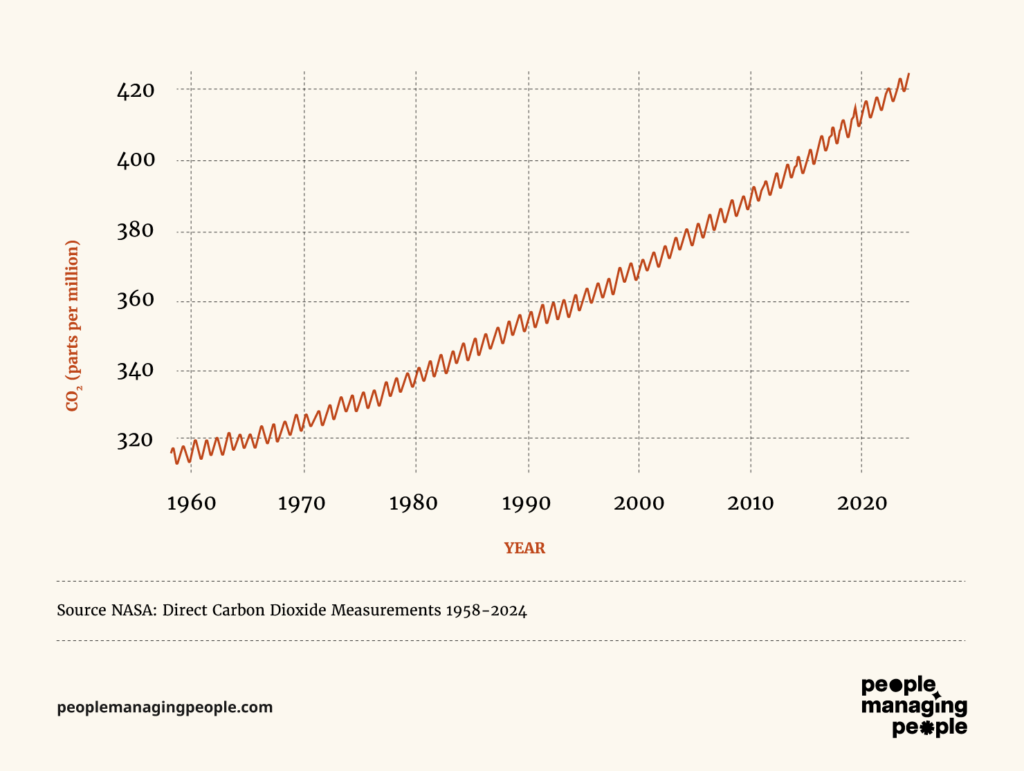For an organization to survive and thrive it needs to be nimble enough to respond to the many rapid changes coming in society.
The megatrends of AI, globalization, the aftermath of the COVID-19 pandemic, demographic shifts, and environmental and social governance (ESG) requirements are all challenging the very nature of business and our future workforce.
The climate crisis is perhaps the granddaddy of all these changes.
Scientists are now warning that our lack of action on climate will result in faster-than-predicted warming. 350 parts per million CO2 concentration in the atmosphere is seen as the threshold for safety for humanity. We are currently over 427 parts per million and rising rapidly.
This is bad news for all of us, including businesses. 55% of global GDP, equivalent to an estimated $58 trillion, is moderately or highly dependent on a natural world that’s under threat.

HR and People professionals can play an important role in the transition towards more sustainable business practices.
By embedding sustainability into HR policies and practices, organizations can help protect their future and foster a workforce that finds their work more meaningful and engaging.
How HR Can Contribute To Sustainable Business Practices
While many businesses seek to address sustainability in some way, even those with strong sustainability strategies have not fully integrated sustainability across all their core business functions and roles.
HR and People play a pivotal role in progressing this integration and helping businesses prepare for the corresponding legislative and regulatory changes that are emerging globally.
Among these changes:
- Addressing modern slavery within the workplace and supply chain.
- Planning for future climate change scenarios as part of risk management.
- Increased risk of litigation on climate-related issues (as of December 2022 there had been 2,180 climate-related cases filed).
- Investors use Environmental, Social, and Governance (ESG) criteria to determine investment decisions.
All these factors make sustainability a crucial factor for business success. They also create the potential for increased liability risks for business directors. Boardroom requests for HR-related action on sustainability are likely to increase as a result.
A massive global transition away from fossil fuels and unsustainable and unethical practices is underway.
This offers a huge opportunity for HR and People professionals to step up to the exciting work of helping transform our organizations and repairing the damage already done to our planet and society.
Here are three ways HR professionals can focus on sustainability.
Method one: Strategy and action
To win hearts and minds, not just bums on seats, employers need to highlight their efforts to be good global citizens in a genuine way. In 2024 there is a lower tolerance for greenwashing than ever before.
Sustainability efforts need to be tangible, actionable, and present in all business decisions. High-level targets and PR are not enough.
Sustainability should lie at the heart of the business strategy to build resilient and future-proof organizations. As an HR and People professional, organizational strategy is a great place to begin.
Checklist of actions:
- Find out if commitments to sustainability have already been made within your organization:
- Does your business have a sustainability strategy?
- Reach out to those who lead it and find out how you and your team can get more involved OR
- If not, begin a serious conversation with your C-suite about why this needs to be resourced and how. After all, people are your specialty.
- Does your business have a sustainability strategy?
- Start having the conversation. Start talking to people within your team and the wider organization about sustainability and the climate crisis, what it means, and how you can contribute to making a difference.
Method two: Recruitment and retention
The roles you recruit for, the responsibilities and KPIs, and the training provided all need to reflect a commitment to sustainability.
For those seeking a career with a purpose, businesses with a clear sustainability strategy and evidence of tangible progress on their website stand out.
If you can demonstrate that you are an organization motivated to make a difference, and willing to embrace those wanting to be a part of the change, you will be able to attract these applicants.
By recruiting, training, and supporting sustainability practitioners across professions within your business, you can accelerate the implementation of sustainability, gaining momentum as you win over hearts and minds by building the capability and capacity needed across your workforce.
Checklist of Actions:
- Review your recruitment, selection, and induction processes to identify where sustainability can be better integrated.
- Review your recruitment materials—is sustainability integrated consistently throughout these?
- Website
- Social media
- Job advertisements
- Position descriptions
- Graduate programs
- Remuneration schemes
- Review current position descriptions and identify simple ways to integrate sustainability elements relevant to each role.
- Identify sustainability training required for core professions across your organisation.
Method three: Support a culture of sustainability
When we bring passion and purpose to our work we are inevitably more engaged, focused, and productive.
Knowing that their efforts contribute to a sustainable future for them and their loved ones can be highly motivating for employees.
One study found that morale was 55% better in companies with strong sustainability programs and employee loyalty 38% better.
It’s important to consider the attractiveness of the industry you are in and the reputation of your company and plan accordingly, especially for younger generations.
To attract and retain the talent you need requires a good dose of sustainability factor. Everything about your company sends a message about sustainability. Is it a good one?
Here is a quick checklist to start building a tangible and visible culture of sustainability in your workplace.
Checklist of Actions:
- Encourage employee involvement by creating opportunities for employees to get involved in sustainability initiatives
- Build a Green Team: Ensure a People and HR representative is part of a group of like-minded people identifying and implementing sustainability actions
- Review your onboarding process, is sustainability integrated as part of this?
- Review your office setup for:
- Good indoor air quality
- Energy efficiency
- Views of greenery or outdoor areas
- No under-desk bins in office areas
- Good recycling and compost systems in common areas
- Paper-free business systems
- Reusable coffee cups and lunch containers available for takeaways
- End-of-trip cycle and scooter parking facilities, showers, and lockers
- Proximity to public transport
- Electric vehicle charging
- Green building certifications e.g. LEED or Living Building.
HR and People have done a lot in the past twenty years to make health and safety a normal part of the work environment. We are now about to embark on the same transition with sustainability.
By integrating sustainability into HR and people policies, companies can foster a workforce that finds their work more meaningful and engaging.
Sustainability initiatives not only benefit the environment and society but will help your business navigate the challenges of the 21st century.
A commitment to sustainability, supported by HR, will be essential for thriving in a rapidly changing world.
Test your HR Sustainability Literacy here.
Join The People Managing People Community
For more guidance on how HR can help boost sustainability efforts, join our supportive community of HR and business leaders sharing knowledge and best practices to help you grow in your career and make a greater impact in your org.



